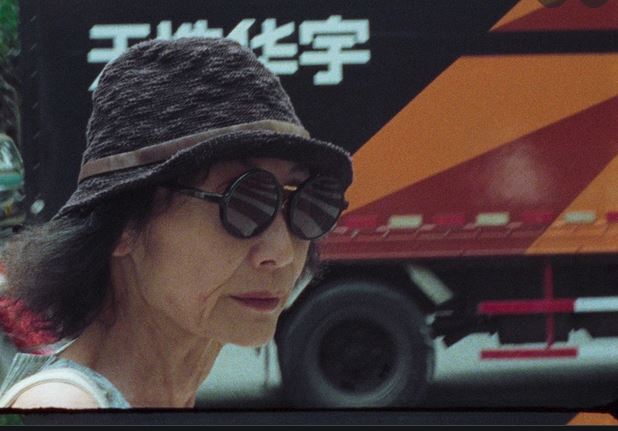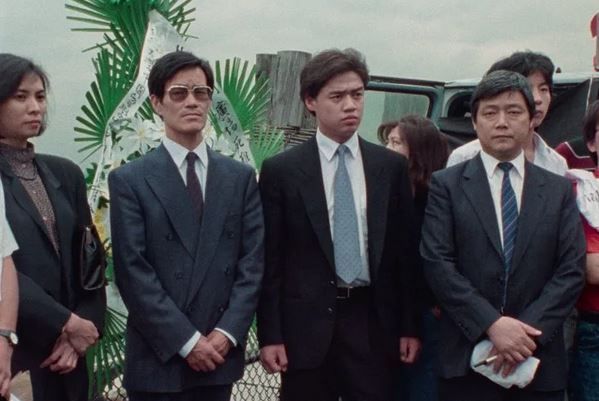By Jana Monji, AsAmNews Arts & Culture Reporter
The Exiles is a curious documentary. You think this documentary is going in one direction and then it takes a sharp turn and nothing the directors do ties both these themes together. Directed by Violet Columbus and Ben Klein, the film begins with Oscar-nominated documentary maker Christine Choy,’s raspy voice and salty language.
“That’s the problem. How the f*ck am I going to explain to anyone where I’m from? It’s so complicated. Homeless. It’s philosophical homeless. Exile.” The camera introduces us to a figure sitting on a chair on a carpet in front of a black backdrop. A clapboard is in front of her face as the crew begins the shot. Then the camera goes in for a closeup. She speaks Mandarin Chinese and then translates for herself as the camera pulls back: “My name is Christine Choy. I’m half and half, half Chinese, half Korean. I now live in America.”
Then we cut to scenes of New York City and Canal Street, a street that has Chinese characters on the sign. We see Choy on the street, lighting up a cigarette. In what appears to be an office, she again faces the camera. “How do I describe myself? F*ck you. You describe me.” She does eventually describe herself as “I am a thinker,” and she qualifies that, “not a very conventional thinker.” She is also not a conventional filmmaker or professor.
Todd Phillips (Joker, 2019 and The Hangover series) recalls taking her class and remembers that she smoked in a classroom that had no windows, and she always has a drink with her. He later learned it was vodka on the rocks. According to Phillips, Choy said, “The first rule about documentary film, lie to everyone.”
There’s a weird jump forward to 2017 (protest against Donald Trump at Sundance) and then back to 1989. On 29 March 1989, Choy attended the 61st Academy Awards at the Shrine Auditorium. The documentary Who Killed Vincent Chin which Choy co-directed with Renee Tajima (now Tajima-Peña). The documentary The Exiles never shines a light on Tajima-Peña who is still actively making documentaries, including the five-part PBS docuseries Asian Americans which she produced. Tajima-Peña was born and raised in Los Angeles County (Pasadena).
In 1990, Choy and Tajima-Peña with Geof Bartz directed (Tajima-Peña wrote) The Best Hotel on Skid Row, a documentary about the Madison Hotel in downtown Los Angeles.
Choy recalls that she told Robert Redford that his festival was “white on white,’ that there were no people from minorities there, and then the next year she would come back as a juror. But is this true? She also recalls the 61st Academy Awards as “there were no black people at Oscars.” The directors then show clips of the disastrous Snow White opening number with references to what used to be Grauman’s Chinese Theatre (now TCL Chinese Theatres). There’s even a clip of the presenters announcing the Best Documentary winner, Hôtel Terminus: The Life and Times of Klaus Barbie – Marcel Ophuls. That film has already won the FIPRESCI Award at the 1988 Cannes Film Festival.
Here Choy claims, “There were no Black people at Oscars.” She also explains, “There were no Asian members at the Oscars. I mean the documentary branch. I think there were two, so you can’t even lobby.”
I don’t know if the latter part is true, but I did find other Asian American history documentaries winning Oscars. In 1994, directors Freida Lee Mock and Terry Sanders would win for the documentary feature Maya Lin: A Strong Clear Vision. In 1990, Steven Okazaki would win for his documentary short, Days of Waiting, about Estelle Ishigo, a White woman who followed her Nisei husband to Heart Mountain War Relocation Center. In 1997, a fictional short, Visas and Virtue, directed by Chris Tashima and Chris Donahue (also starring Tashima) won the Oscar.
Moreover, there were Black people at the 61st Academy Award Ceremony. I investigated this at length. You can read the full results in my extended essay on my blog: Christine Choy and ‘The Exiles’ and Unanswered Questions.
Did this documentary’s co-directors Violet Columbus and Ben Klein not thoroughly investigate this claim? It seems unlikely they would have missed that Gregory Hines and Sammy Davis Jr. were listed as presenters. Did Choy miss the presentation by these two men? Did she miss or forget the performances of Black actors on stage? In the documentary, Choy also noted that many of the actors were not seated in the auditorium during the ceremony because they were elsewhere–in the bathroom drinking or smoking. Considering Choy’s addictive personality, perhaps that’s where she was, missing much of the presentation and thus giving a skewed view of an event. And that makes one wonder: What else did Choy miss?
Yet this is where the documentary veers from Choy into the unfinished documentary feature, The Exiles. The June Fourth Incident, also known as the 1989 Tiananmen Square protests and massacre left its leaders in precarious positions. Pro-democracy students and others went into hiding and those who were able, escaped to other countries. Three, Wu’er Kaixi, Yan Jiadi and Wan Runnan, found themselves in the United States.
In June when the protests occurred, Choy was in Los Angeles for HBO. Choy later filmed the three speaking at a democracy convention in Chicago for Chinese students, in Battery Park and a Long Island safe house in New York. The footage never became a documentary; Choy said she ran out of money. She also felt disconnected from the protest. Like the three dissidents, Choy also thought the terms of the exile would be temporary. Thirty years later, the men remain in exile.
Wu’er Kaixi is a political commentator and unsuccessful political candidate in Taiwan. He poignantly comments, “Uyghur by blood, Chinese by birth, Taiwanese by choice.” Yet that’s not entirely true. As a supposedly wanted criminal, Wu’er Kaixi has tried to return to see his parents by having himself arrested in Macau and other places like Japan, only to be deported back to Taiwan.
When these three men appear before U.S. Congress in 2019, they call upon the US government to recognize its complicity. If the US has supported Chinese democracy in 1989, how would history have been changed? More personally, Wu’er Kaixi asks would the current Uyghur genocide have been averted?
Wu’er Kaixi (吾爾開希·多萊特) has faced some criticism with some of his claims questioned which I don’t recall this documentary addressing.
The film does give some information about these three in what would ordinarily be the pre-credits epilogue:
Wu’er Kaixi remains an outspoken critic of the CCP’s religious persecution of Uyghur Muslims. He was recently named General Secretary of Taiwan’s Parliamentary Human Rights Commission.
Yan Jiadi eventually reunited with his son in America. He recently completed his memoir.
Wan Runnan’s company Sitong was raided by CCP officials following the Tiananmen Square Massacre. Sitong was eventually disbanded.
The Chinese government continues to censor all mentions of the Tiananmen Square Massacre.
The audience might feel cheated that it misses Yan Jiadi’s reunion with his son. The information about Wan Runnan seems outdated. That’s information from 30 years ago. After these titles are shown against a black screen, the film doesn’t end. There’s more.
The film then returns to Choy. Choy asks, “Who is going to document this issue? Journalists? You can write about it, but most Americans don’t read.” Choy then concludes, “Filmmaking is very important. It’s visual communication.” She adds, “Documentary is the true recording of history while it’s unfolding.” Yet don’t forget that Choy also told her students to always lie and another documentary at Sundance, Free Chol Soo Lee showed the importance of the written word, at least in 1978. Choy’s own Who Killed Vincent Chin? also records the power of journalism (e.g. Helen Zia). Of course, now we’re in the era of social media, a world once ruled by Facebook, but now taken over by the Chinese social media app TikTok, a topic addressed in another Sundance documentary, TikTok Boom.
Certainly, Choy’s preservation of 50 rolls of 60 mm for 30 years is an amazing find, a precious documentation of history. Choy chortles with delight, saying “revisiting all my old films, rediscover myself.” For her, “it’s greatest therapy; I don’t even have to pay a shrink.” A therapist might ask more probing questions.
A better documentary might have answered some of the questions raised. Choy or the unobtrusive directors Violet Columbus and Ben Klein might have questioned Choy in instances where she made incorrect statements or somehow indicated what she said was untrue. Her unfortunate statements about the 61st Oscars provide fuel for #OscarsSoWhite, but as I have indicated, they were not true. Further, Choy wasn’t alone at the Oscars. There is no statement from her co-director, Tajima-Peña, another Asian American woman.
Renee Tajima-Pena is a professor of Asian American Studies and Director of the Center of EthnoCommunications and holder of the Alumni and Friends of Japanese American Ancestry Endowed Chair. She was a Guggenheim Fellow. Surely as the co-director of more than one of Choy’s documentaries, Tajima-Pena would have had some insight worth hearing.
While I admire having an Asian American woman, a self-proclaimed exile, who does not fit the US stereotype of an East Asian woman–pliant, subservient and quiet, Choy also fits the trope of the troubled and self-destructive artist.
Despite the problems I have outlined, The Exiles was awarded the US Grand Jury Prize for documentary. Running time: 1 hour 35 minutes.
For an extended version of this essay, visit AgeOfTheGeek.org.
AsAmNews has Asian America in its heart. We’re an all-volunteer effort of dedicated staff and interns. Check out our new Instagram account. Go to our Twitter feed and Facebook page for more content. Please consider interning, joining our staff, or submitting a story, or making a contribution.


